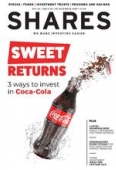Archived article
Please note that tax, investment, pension and ISA rules can change and the information and any views contained in this article may now be inaccurate.
ETFs to track small caps in the US, UK and Japan

There is a reason why some investors think the best things come in small packages. Smaller companies, just by virtue of their size, have more significant growth potential and could increase their revenue at a rapid rate if things are going well.
With higher reward comes higher risk however, and without the right knowledge trying to invest in small caps can expose you to significant losses.
Even the savviest of stock pickers can come unstuck. For every success story, there are examples of business which have disappointed and in some cases left shareholders with nothing.
One way to capture some (though by no means all) of the returns of small cap stocks, but without risking a major hit on a flashy firm going bust, is to seek diversified exposure. Small cap exchange-traded funds (ETFs), most of which seek to track a basket of smaller firms, are a relatively low cost way of pursuing this strategy.
Three of the most developed markets across the world for small caps are the US, UK and Japan.
Here’s a bit more on why each market is good for small caps, and an ETF to play the space.
US MARKETS
Research from renowned corporate finance professor Aswath Damodaran found that from 1926 to 2014, listed companies in the lowest decile in terms of valuation made annual returns which were 4.33% more than the market.
Analysis by investment bank Jefferies found that over the past six decades, small caps have risen by an average of 28% in the 12 months after US central bank the Federal Reserve decides to cut interest rates. Large and mid-caps on the other hand have risen by 15%.
Small cap ETF outperformance in the US may hinge on which index you track.
The S&P SmallCap 600 index in the past year has returned 6.6%, while the Russell 2000 index has returned 11.1%.
Legal & General and State Street both offer ETFs that track the latter index. The L&G one has a total expense ratio (TER) of 0.45% a year, whereas the State Street one is considerably cheaper with a TER of 0.3%. The latter is called SPDR Russell 2000 US Small Cap ETF (R2SC).
UK MARKETS
Usually the small cap space in the British markets works to the advantage of an active fund manager. The relative lack of analyst coverage means a savvy stockpicker has a better chance of taking advantage of undervalued stocks.
But that also means the options for ETFs or index tracker funds are limited, which is a shame when considering the performance of large cap indices compared to small cap ones.
For example, in the 15 years to 31 October 2019, the large and mid-cap MSCI UK index has delivered a cumulative gross return of 190.5%. The MSCI UK Small Cap index by comparison has returned 355.8%.
iShares MSCI UK Small Cap ETF (CUKS) has a total cost of 0.58% a year. Its performance has been strong with a five-year annualised return of 9.2%, partly driven by success stories including FeverTree (FEVR:AIM)and Blue Prism (PRSM:AIM).
It’s worth nothing the MSCI UK Small Cap Index tracked by the ETF tracks is a bit of a funny one though, offering protection to investors with some bigger stocks but perhaps not living up to the true spirit of tracking small caps.
For example, the index includes six companies in the FTSE 100, with Rightmove (RMV), insurers Hiscox (HSX) and Phoenix (PHNX) and packaging firm DS Smith featuring in the top 10 holdings. Therefore it isn’t strictly a pure-play small cap product.
JAPANESE MARKETS
Japanese small caps typically receive little analyst coverage in the West, with several listed on the Tokyo Stock Exchange Second Section.
This part of the market can resemble the Wild West in that the only thing you’ll see at times is tumbleweed, with most small caps in this space getting zero analyst coverage.
Research from WisdomTree found that investors could be missing out, as Japanese small caps tend to have greater free cash flow and dividend growth than large caps.
That’s perhaps one of the reasons why the MSCI Japan Small Cap Index has delivered an annualised five-year return of 10.1%, a stronger return that most small cap markets.
However, strategists from French bank Societe Generale have warned that going forward, Japanese small caps could be hit by an economic slowdown.
That’s because the stocks in Japanese small cap indices tend to be skewed towards consumer-facing companies, and are therefore vulnerable to a slowdown in consumer spending, which could be the on the way with a tax hike set to come into force in Japan next year.
But the Japanese small cap index has proved itself less volatile that other comparable indices, as well as some of the bigger ones.
Those who like the Japan small cap story may want to look at iShares MSCI Japan Small Cap (ISJP). It has a TER of 0.58% and its five-year annualised return of 14.5% is impressive.
Important information:
These articles are provided by Shares magazine which is published by AJ Bell Media, a part of AJ Bell. Shares is not written by AJ Bell.
Shares is provided for your general information and use and is not a personal recommendation to invest. It is not intended to be relied upon by you in making or not making any investment decisions. The investments referred to in these articles will not be suitable for all investors. If in doubt please seek appropriate independent financial advice.
Investors acting on the information in these articles do so at their own risk and AJ Bell Media and its staff do not accept liability for losses suffered by investors as a result of their investment decisions.
Issue contents
Editor's View
Exchange-Traded Funds
Great Ideas
Great Ideas Update
News
- Japan’s public pension fund bans short-selling on ESG grounds
- Black Friday boost for retailers including Boohoo
- Good and bad: how the Tories and Labour could impact your wealth
- Investors ‘may only see small UK market bounce’ on a Tory majority win
- Activist investor accuses mainstream managers of ‘greenwash’
- What are the prospects for oil prices and big oil firms?
 magazine
magazine












